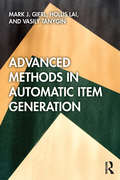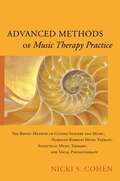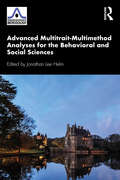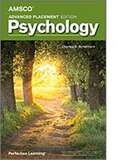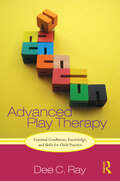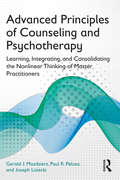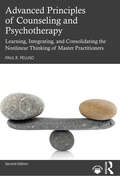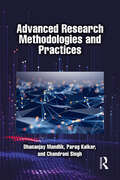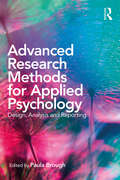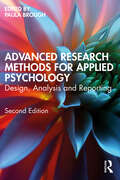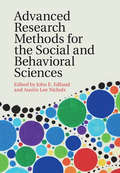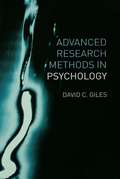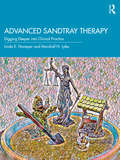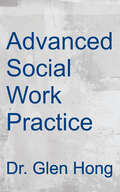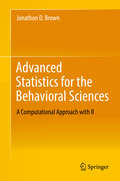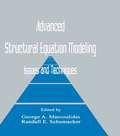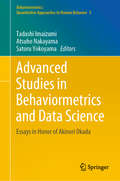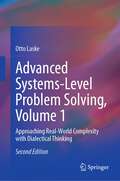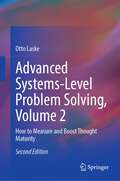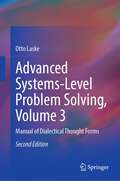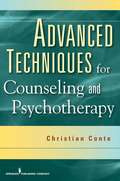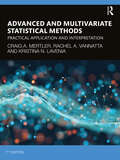- Table View
- List View
Advanced Methods in Automatic Item Generation
by Mark J. Gierl Hollis Lai Vasily TanyginAdvanced Methods in Automatic Item Generation is an up-to-date survey of the growing research on automatic item generation (AIG) in today’s technology-enhanced educational measurement sector. As test administration procedures increasingly integrate digital media and Internet use, assessment stakeholders—from graduate students to scholars to industry professionals—have numerous opportunities to study and create different types of tests and test items. This comprehensive analysis offers thorough coverage of the theoretical foundations and concepts that define AIG, as well as the practical considerations required to produce and apply large numbers of useful test items.
Advanced Methods in Family Therapy Research: A Focus on Validity and Change
by Lee N. Johnson Richard B MillerResearch is vital in moving the field of family therapy forward, but the myriad of possibilities inherent in working with systems and individuals can overwhelm even the most seasoned researcher. Advanced Methods in Family Therapy Research is the best resource to address the day-to-day questions that researchers have as they investigate couples and families, and the best source for learning long-term theory and methodology. The contributors of this volume share their wisdom on a wide variety of topics including validity concerns, measuring interpersonal process and relational change, dyadic data analysis (demonstrated through a sample research study), mixed methods studies, and recruitment and retention. The volume contains one of the most detailed descriptions of data collections and covers interviewing, using questionnaires, and observing brain activity. Also addressed are suggestions to meaningfully reduce cultural bias, to conduct ethical research, and, in the Health Services Research chapter, to examine interventions for clients in various income brackets. A separate, ground-breaking chapter also addresses psychophysiological research in a couple and family therapeutic context. As an added benefit, readers will learn how to become informed consumers of journal articles and studies, how to produce quality, publishable research, and how to write fundable grant proposals. Each chapter provides a clear and detailed guide for students, researchers, and professionals, and as a whole Advanced Methods in Family Therapy Research advances the field by teaching readers how to provide evidence that marriage and family therapy not only relieves symptoms, but also effects behavioral change in all family members.
Advanced Methods of Music Therapy Practice: Analytical Music Therapy, The Bonny Method of Guided Imagery and Music, Nordoff-Robbins Music Therapy, and Vocal Psychotherapy
by Nicki S. CohenAnalytical Music Therapy, The Bonny Method of Guided Imagery and Music, Nordoff-Robbins Music Therapy, and Vocal Psychotherapy are commonly studied and in conjunction with music therapy. This book examines the development of these four advanced methods of music therapy practice in relation to each other, and explores their impact on the development of the music therapy profession. Based on extensive new research and interviews with leading practitioners of the advanced methods, the book describes the differences, similarities, relationships, and trends between them, compares linearly the development of the music therapy profession primarily in the 20th century with the development of the four advanced methods, and speculates on the future of these advanced methods in relation to the future of music therapy as a profession.
Advanced Multitrait-Multimethod Analyses for the Behavioral and Social Sciences (European Association of Methodology Series)
by Jonathan Lee HelmThis book summarizes a range of new analytic tools for multitrait-multimethod (MTMM) data. Providing an expository yet accessible approach to cutting-edge developments for MTMM analysis, a selection of quantitative researchers reveal their recent contributions to the field including non-technical summaries and empirical examples. The contributions inform quantitative social scientists of some of the most cutting-edge developments for MTMM analysis. A range of developments have emerged over the past decade for MTMM analyses, and this book presents these novel additions to the quantitative community as a cohesive narrative. This book makes these recent MTMM contributions accessible to applied researchers (most MTMM innovations are presented in less approachable journals for applied researchers) by providing non-technical summaries and empirical examples. This book will serve as a stepping stone for applied researchers seeking to adopt MTMM analysis into their program of research, and will be relevant to researchers, both within a professional and academic context, across the social and behavioral sciences.
Advanced Neuroradiology Cases
by Suzanne Amaral Lázaro Luís Faria do Bag Asim K. Gonçalves Fabrício Guimarães Hanagandi Prasad B. Byan-Parker Prasad B. Byan-ParkerFeaturing atypical cases and focusing on advanced imaging techniques, this book presents a compilation of unusual CNS pathologies with characteristic imaging findings. The aim is to aid the speedy diagnosis of otherwise rarely encountered clinical conditions and improve patient care. Presented as more than 130 real cases with extensive imaging description and step-by-step guidelines on how to diagnose individual pathologies, each scenario is backed by the most up-to-date literature available. The cases include some of the most recently described clinical conditions. The case-based format and description of each clinical journey encourages readers to engage with the diagnostic process and facilitates self-study. This book is for any radiologist who practices neuroradiology, neuroradiology fellows, neuroimaging fellows, practicing neurologist and neurology residents.
Advanced Placement Psychology
by Charles D. SchallhornIt teaches students how to think critically and scientifically about the underlying mechanisms of behavior and cover all topics for the AP Psychology course. In every chapter, important discoveries are explained, the impact on everyday life is examined, and current research is used to see each behavioral principle in action.
Advanced Play Therapy: Essential Conditions, Knowledge, and Skills for Child Practice
by Dee RayCurrent play therapy resources offer details on how to conduct play therapy, but are limited in addressing the challenges that develop when therapists conduct play therapy with real-life clients. Using the Child-Centered Play Therapy Approach, Ray has written the first book to address these complex play therapy subjects. Topics covered include: integrating field knowledge of play, development, and theory into the advanced play therapist’s knowledge base; working with difficult situations, such as limit-setting, aggression, and parents; addressing modern work concerns like measuring progress, data accountability, and treatment planning; differentiating play therapy practice in school and community settings; and addressing complicated skills, such as theme work, group play therapy, and supervision. Ray also includes her Child Centered Play Therapy Treatment Manual, an invaluable tool for any play therapist accountable for evidence-based practice. This manual can also be found on the accompanying downloadable resources, along with treatment plan, session summary, and progress-tracking worksheets.
Advanced Practice in Mental Health Nursing: A European Perspective
by Agnes Higgins Nina Kilkku Gisli Kort KristoferssonThis textbook explores issues central to the provision of recovery-orientated care based on ethical principles and human rights perspectives. Written by academics and nurse practitioners, this comprehensive text draws together theory, research and practice to map the landscape of Advanced Practice in Mental Health Nursing (APMHN) in Europe. Underpinned by a rights- and relational- based approach to care, the textbook is organized around six themes: theoretical and historical perspectives; foundations for collaborative working; therapeutic engagement in different contexts; beyond the clinical dimension of the APMHN role; advancing the evidence-based practice agenda and emerging issues and challenges. Each theme consists of a number of chapters that are designed to address different aspects of APMHN. With a focus on illuminating the collaborating aspect of their role and advancing nurses’ competencies, debates and guidance are provided in areas such as therapeutic alliance, assessment, care-planning, mental health promotion, family work, trauma, diversity and culture, spirituality, risk and uncertainty, and prescribing. In addition to addressing the leadership, education and advocacy role, specific chapters explore the APMHN role in linking evidence to practice, in the participatory generation of evidence and maintaining professional competence. With a focus on future challenges and opportunities the textbook concludes with discussion on issues, such as eMental Health and future challenges and possibilities facing APMHNs, including challenges in informing policy, democratizing services, working across service and disciplinary boundaries, collaboratively shaping the evidence agenda, as well sustaining their role into the future. Within the book theoretical debate is grounded in case studies and/or examples from across Europe. This textbook is especially relevant to Mental Health Nurses undertaking studies at the Advanced Practice level. It is also suited to all Mental Health Nurses studying at post-graduate level who wish to advance their practice irrespective of the country. Educators, researchers and policy-makers involved in the area of Mental Health and Advanced Nursing Practice along with people with lived experiences will find the text of relevance.
Advanced Principles of Counseling and Psychotherapy: Learning, Integrating, and Consolidating the Nonlinear Thinking of Master Practitioners
by Joseph Lisiecki Gerald J. Mozdzierz Paul R. PelusoAdvanced Principles of Counseling and Psychotherapy covers advanced helping-skills topics, including inductive reasoning, Socratic questioning, working with double binds, and creatively creating second-order change. The ultimate expression of these is in the use of paradoxical interventions, including the use of humor. Professors and students alike will find that Advanced Principles of Counseling and Psychotherapy is not just a guide to training; it provides an in-depth understanding of material covered in introductory courses and supplements the material students will cover in practicum and internship.
Advanced Principles of Counseling and Psychotherapy: Learning, Integrating, and Consolidating the Nonlinear Thinking of Master Practitioners
by Paul R. PelusoThe second edition of Advanced Principles of Counseling and Psychotherapy covers advanced helping- skills topics, including inductive reasoning, Socratic questioning, and creatively creating second- order change. Chapters explore strategies for using paradoxical interventions, including the use of humor, and working with double- binds. Professors and students alike will find that Advanced Principles of Counseling and Psychotherapy, 2nd ed., is not just a guide to training; it provides an in- depth understanding of material covered in introductory courses and supplements the material students will cover in practicum and internship.
Advanced Research Methodologies and Practices
by Chandrani Singh Dhananjay Mandlik Parag KalkarThis comprehensive textbook is designed to equip researchers, academics, and students with the essential tools and knowledge needed to conduct advanced research across various disciplines.The book addresses crucial aspects of research dissemination and publication, offering insights into scholarly writing, manuscript preparation, and the peer review process, empowering researchers to effectively communicate their findings and contribute to their respective fields. It covers salient topics such as formulating research questions, designing research studies, and selecting appropriate research methodologies. It emphasizes the importance of rigorous and ethical research practices and explores strategies for conducting literature reviews and synthesizing existing knowledge. It also delves into advanced quantitative and qualitative research methods, offering detailed explanations of statistical analyses, data collection techniques, and sampling strategies.Throughout the book, real-world examples, case studies, and practical exercises are integrated to enhance understanding and application of the concepts discussed to equip the readers with the knowledge, skills, and confidence to push the boundaries of knowledge and make a lasting impact. It will serve as an invaluable resource for students, researchers, academics, and industry professionals seeking to enhance their research skills and elevate the quality and impact of their scholarly work.
Advanced Research Methods for Applied Psychology: Design, Analysis and Reporting
by Paula BroughThis is the first comprehensive guide to the range of research methods available to applied psychologists. Ideally suited to students and researchers alike, and covering both quantitative and qualitative techniques, the book takes readers on a journey from research design to final reporting. The book is divided into four sections, with chapters written by leading international researchers working in a range of applied settings: Getting Started Data Collection Data Analysis Research Dissemination With coverage of sampling and ethical issues, and chapters on everything from experimental and quasi-experimental designs to longitudinal data collection and focus groups, the book provides a concise overview not only of the options available for applied research, but also of how to make sense of the data produced. It includes chapters on organizational interventions and the use of digital technologies, and concludes with chapters on how to publish your research, whether it’s a thesis, journal article or organisational report. This is a must-have book for anyone conducting psychological research in an applied setting.
Advanced Research Methods for Applied Psychology: Design, Analysis and Reporting
by Paula BroughAdvanced Research Methods for Applied Psychology provides a comprehensive discussion of 21 key topics for the completion of an applied psychology (or similar) research thesis/project.The book provides a one-stop shop for the current issues and discussions of key research methods and common statistical analysis techniques, but avoids being a step-by-step instruction guide. The book is divided into four sections, representing the stages of thesis completion: getting started, data collection, data analysis, and reporting research. Each chapter presents a detailed scholarly discussion on a topic and represents the most up-to-date reference for that topic. The Chapters also provide key references for further detailed readings and guides. The chapters are authored by leading researchers from all around the world. This book discusses both emerging and traditional research methods commonly utilised within applied psychology research projects and directly assists early researchers in providing an informed discussion of their decisions relating to their choice of, for example, research sampling, the use of diary studies, appropriate survey time-lags, conducting systematic reviews, and the macro and micro process issues involved with conducting organisational interventions.This book is an important reference text for applied psychology research thesis/project students and researchers, including both undergraduate and postgraduate students. It will be of interest to applied psychology researchers in all fields (clinical, organisational, developmental, forensic, etc.) and to those in other disciplines. The book provides coverage of advanced research methods and statistical topics and is suitable for adoption for these courses in honours/post-graduate levels of study within applied psychology and related fields.
Advanced Research Methods for the Social and Behavioral Sciences
by John E. Edlund Austin Lee NicholsWritten by an interdisciplinary team of global experts covering diverse research methods - including research design, research tools, and statistical techniques - this volume focuses on advanced research methods for anyone working in the social and behavioral sciences. The information needed to perform research in the laboratory, the field, or online is mapped out to provide specific applications and tools in applying each method. The issues surrounding reliability, validity, and obtaining consent are explained alongside detailed descriptions of the impact of pre-knowledge on participant behavior, the ways that researchers unintentionally influence participants, and tips on administering suspicion probes and debriefings. The book then lays out bio-physiological measures, eye-tracking methods and technologies, the construction of questionnaires, and reaction-time methodologies without assuming too much prior knowledge. The basics of Bayesian analysis, item response analysis, social network analysis, and meta-analysis are also summarised as the editors combine innovative methods and statistics to showcase how to perform quality research.
Advanced Research Methods in Psychology
by David GilesHow do you perform a MANOVA? What is grounded theory? How do you draw up a repertory grid? These, and many other questions are addressed in this wide-ranging handbook of methods and analytic techniques which uniquely covers both quantitative and qualitative methods.Based on a broad survey of undergraduate curricula, the book takes curious readers through all of the methods that are taught on psychology courses worldwide, from advanced ANOVA statistics through regression models to test construction, qualitative research and other more unusual techniques such as Q methodology, meta-analysis and log-linear analysis. Each technique is illustrated by recent examples from the literature. There are also chapters on ethics, significance testing, and writing for publication and research proposals.Advanced Research Methods in Psychology will provide an invaluable resource for advanced undergraduates, postgraduates and researchers who need a readable, contemporary and eclectic reference of advanced methods currently in use in psychological research.
Advanced Sandtray Therapy: Digging Deeper into Clinical Practice
by Linda E. Homeyer Marshall N. LylesAdvanced Sandtray Therapy deepens mental health professionals’ abilities to understand and apply sandtray therapy. Chapters show readers how to integrate clinical theory with sand work, resulting in more focused therapeutic work. Using practical basics as building blocks, the book takes a more detailed look at the ins and outs of work with attachment and trauma, showing therapists how to work through the sequence of treatment while also taking into account clients’ trauma experiences and attachment issues. This text is a vital guide for any clinician interested in adding sandtray therapy to their existing work with clients as well as students in graduate programs for the mental health professions.
Advanced Social Work Practice
by Dr Glen HongGlen Hong is the Department Chair of the Social Work Department at Whittier and is Co-owner of 12 Week Relationships. Dr. Hong has over 20 years of clinical experience both as a Clinical Psychologist and Social Worker, and does extensive research on relationships, trauma and core values through the TWR Institute which he also co-founded.
Advanced Statistics for the Behavioral Sciences: A Computational Approach with R
by Jonathon D. BrownThis book demonstrates the importance of computer-generated statistical analyses in behavioral science research, particularly those using the R software environment. Statistical methods are being increasingly developed and refined by computer scientists, with expertise in writing efficient and elegant computer code. Unfortunately, many researchers lack this programming background, leaving them to accept on faith the black-box output that emerges from the sophisticated statistical models they frequently use. Building on the author’s previous volume, Linear Models in Matrix Form, this text bridges the gap between computer science and research application, providing easy-to-follow computer code for many statistical analyses using the R software environment. The text opens with a foundational section on linear algebra, then covers a variety of advanced topics, including robust regression, model selection based on bias and efficiency, nonlinear models and optimization routines, generalized linear models, and survival and time-series analysis. Each section concludes with a presentation of the computer code used to illuminate the analysis, as well as pointers to packages in R that can be used for similar analyses and nonstandard cases. The accessible code and breadth of topics make this book an ideal tool for graduate students or researchers in the behavioral sciences who are interested in performing advanced statistical analyses without having a sophisticated background in computer science and mathematics.
Advanced Structural Equation Modeling: Issues and Techniques
by George A. Marcoulides Randall E. SchumackerBy focusing primarily on the application of structural equation modeling (SEM) techniques in example cases and situations, this book provides an understanding and working knowledge of advanced SEM techniques with a minimum of mathematical derivations. The book was written for a broad audience crossing many disciplines, assumes an understanding of graduate level multivariate statistics, including an introduction to SEM.
Advanced Studies in Behaviormetrics and Data Science: Essays in Honor of Akinori Okada (Behaviormetrics: Quantitative Approaches to Human Behavior #5)
by Tadashi Imaizumi Atsuho Nakayama Satoru YokoyamaThis book focuses on the latest developments in behaviormetrics and data science, covering a wide range of topics in data analysis and related areas of data science, including analysis of complex data, analysis of qualitative data, methods for high-dimensional data, dimensionality reduction, visualization of such data, multivariate statistical methods, analysis of asymmetric relational data, and various applications to real data. In addition to theoretical and methodological results, it also shows how to apply the proposed methods to a variety of problems, for example in consumer behavior, decision making, marketing data, and social network structures.Moreover, it discuses methodological aspects and applications in a wide range of areas, such as behaviormetrics; behavioral science; psychology; and marketing, management and social sciences. Combining methodological advances with real-world applications collected from a variety of research fields, the book is a valuable resource for researchers and practitioners, as well as for applied statisticians and data analysts.
Advanced Systems-Level Problem Solving, Volume 1: Approaching Real-World Complexity with Dialectical Thinking
by Otto LaskeThis three-volume set introduces the practice of advanced, ‘dialectical’ systems-level problem solving in both the social and natural sciences. In social science, it opens new vistas regarding organizational, strategy, and work design. In the natural sciences, it provides heretofore missing conceptions of physical systems in peril due to the climate crisis. In addition, the author draws conclusions that are important for advancing generative AI. The monograph presents novel conceptual tools that directly impact the internal structure of a systems analyst’s mental processing in real time. While the first volume lays the theoretical groundwork for dialectical systems analysis, the second, focusing on the nature of work, lays bare the structure of complex thinking in terms of the ‘thought forms’ it requires. In order to facilitate better understanding of the principles taught in the first two volumes, the third volume provides a Manual of Dialectical Thought Forms, which is the only one in existence today.
Advanced Systems-Level Problem Solving, Volume 2: How to Measure and Boost Thought Maturity
by Otto LaskeThis three-volume set introduces the practice of advanced, ‘dialectical’ systems-level problem solving in both the social and natural sciences. In social science, it opens new vistas regarding organizational, strategy, and work design. In the natural sciences, it provides heretofore missing conceptions of physical systems in peril due to the climate crisis. In addition, the author draws conclusions that are important for advancing generative AI. The monograph presents novel conceptual tools that directly impact the internal structure of a systems analyst’s mental processing in real time. While the first volume lays the theoretical groundwork for dialectical systems analysis, the second, focusing on the nature of work, lays bare the structure of complex thinking in terms of the ‘thought forms’ it requires. In order to facilitate better understanding of the principles taught in the first two volumes, the third volume provides a Manual of Dialectical Thought Forms, which is the only one in existence today.
Advanced Systems-Level Problem Solving, Volume 3: Manual of Dialectical Thought Forms
by Otto LaskeThis three-volume set introduces the practice of advanced, ‘dialectical’ systems-level problem solving in both the social and natural sciences. In social science, it opens new vistas regarding organizational, strategy, and work design. In the natural sciences, it provides heretofore missing conceptions of physical systems in peril due to the climate crisis. In addition, the author draws conclusions that are important for advancing generative AI. The monograph presents novel conceptual tools that directly impact the internal structure of a systems analyst’s mental processing in real time. While the first volume lays the theoretical groundwork for dialectical systems analysis, the second, focusing on the nature of work, lays bare the structure of complex thinking in terms of the ‘thought forms’ it requires. In order to facilitate better understanding of the principles taught in the first two volumes, the third volume provides a Manual of Dialectical Thought Forms, which is the only one in existence today.
Advanced Techniques for Counseling and Psychotherapy
by Christian ContePresents counseling and psychotherapy techniques. This book provides practical applications of counseling theories, including clinical case examples.
Advanced and Multivariate Statistical Methods: Practical Application and Interpretation
by Craig A. Mertler Rachel A. Vannatta Kristina N. LaVeniaAdvanced and Multivariate Statistical Methods, Seventh Edition provides conceptual and practical information regarding multivariate statistical techniques to students who do not necessarily need technical and/or mathematical expertise in these methods. This text has three main purposes. The first purpose is to facilitate conceptual understanding of multivariate statistical methods by limiting the technical nature of the discussion of those concepts and focusing on their practical applications. The second purpose is to provide students with the skills necessary to interpret research articles that have employed multivariate statistical techniques. Finally, the third purpose of AMSM is to prepare graduate students to apply multivariate statistical methods to the analysis of their own quantitative data or that of their institutions. New to the Seventh Edition All references to SPSS have been updated to Version 27.0 of the software. A brief discussion of practical significance has been added to Chapter 1. New data sets have now been incorporated into the book and are used extensively in the SPSS examples. All the SPSS data sets utilized in this edition are available for download via the companion website. Additional resources on this site include several video tutorials/walk-throughs of the SPSS procedures. These "how-to" videos run approximately 5–10 minutes in length. Advanced and Multivariate Statistical Methods was written for use by students taking a multivariate statistics course as part of a graduate degree program, for example in psychology, education, sociology, criminal justice, social work, mass communication, and nursing.
